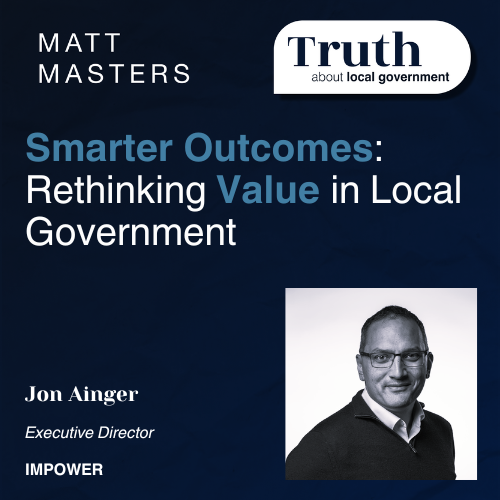Smarter Outcomes: Rethinking Value in Local Government
- truthaboutlocalgov
- Jul 23, 2025
- 6 min read
At first glance, the phrase “Better outcomes should cost less” might sound like a lofty aspiration perhaps even an overly idealistic sentiment that contradicts the long-standing belief that high-quality public services inevitably come with a high price tag. For decades, the prevailing assumption has been that better services require more funding, more staff, and more infrastructure. Yet in today’s climate marked by fiscal constraint, rising demand, and increasing complexity this statement is not just bold. It is essential. It challenges the very foundations of how public services have traditionally been designed, funded, and delivered. It invites us to rethink the relationship between cost and quality, and to explore how smarter, more strategic approaches can deliver improved outcomes without escalating expenditure.
This idea calls into question the assumption that more money automatically leads to better results. Instead, it proposes a more nuanced and forward-thinking model: one that prioritises prevention over cure, empowers individuals and communities to take control of their own wellbeing, and uses limited resources more intelligently to create sustainable, long-term impact.
A Conversation with Jon Ainger: Rethinking Value in Local Government
On 23 July 2025, I had the privilege of sitting down with Jon Ainger, Executive Director at Impower, for a candid and thought-provoking conversation as part of The Truth About Local Government series. Our discussion centred on this very idea that better outcomes can, and should, cost less and how councils across the UK are beginning to embrace a new way of thinking. This emerging approach is grounded in three key principles: a commitment to prevention, the strategic use of behavioural science, and the cultivation of strong, cross-sector partnerships. Together, these elements form the foundation of what we call smarter outcomes that not only improve lives but also reduce the long-term burden on overstretched public systems.
From Firefighting to Foresight
Smarter outcomes are not just about saving money. They are about delivering services that help people stay healthy, independent, and resilient. They are about designing systems that anticipate needs rather than simply reacting to crises. This shift from firefighting to foresight requires a fundamental change in mindset, one that values long-term impact over short-term fixes.

Behavioural Science: A Tool, Not a Silver Bullet
Impower has been applying behavioural science in public services for over 15 years. It’s a powerful tool for influencing behaviour and improving service design. But as Jon pointed out, it’s not a panacea:
“Behavioural science trials on their own are not sufficient. They can demonstrate short-term value, but if you don’t change the system around those trials, it tends not to stick.”
Used effectively, behavioural insights can reshape the way councils interact with residents and how frontline staff engage with service users. Jon shared a compelling example from the world of special educational needs transport:
“When offering home-to-school transport for children with special needs, instead of asking ‘How would you like your child to be transported?’ we ask, ‘How are you planning to transport your child?’ Both are valid questions, but the framing changes the dynamic.”
This subtle shift respects parental agency, encourages shared responsibility, and opens the door to more collaborative and cost-effective solutions.

Confidence: The Missing Ingredient in Transformation
One of the most significant barriers to change, Jon argued, is not funding or policy it’s confidence. “Local government has survived brilliantly up to this point. But more and more councils are coming up against the wall. They’ve exhausted the usual options.”
To move forward, councils must believe in their ability to deliver smarter outcomes. That belief doesn’t come from theory it comes from evidence. From testing new approaches, learning from what works, and scaling successful models.
“Confidence looks like saying, ‘I’ve seen enough evidence to go further and faster.’ It’s about building trust in the programme, step by step.”
Building Internal Capability: People Powering Change
Transformation isn’t just about strategy or policy it’s about people. Over the years, local government’s capacity to lead and manage change has been gradually eroded. Jon was clear that rebuilding this capability is essential:
“It’s not just about hiring project managers. You need to build frontline and management capacity to change complex systems. You need people who can shift behaviours, hold others to account, and sustain change.”
Impower’s approach focuses on equipping councils with the tools, skills, and confidence they need to lead transformation from within. It’s not about parachuting in external solutions it’s about enabling local teams to drive and sustain change themselves.
Data: A Means to an End
Data and analytics are powerful tools that can illuminate opportunities for achieving smarter, more effective outcomes in local government. They help identify patterns, highlight inefficiencies, and guide strategic decisions. However, Jon Ainger offered a cautionary note about the potential pitfalls of relying too heavily on data without purpose:
“Data is only helpful if it helps you take action. Sometimes it becomes a substitute for action a dashboard that looks impressive but doesn’t drive change.”
In other words, the value of data lies not in its volume or complexity, but in its ability to inform meaningful action. The ultimate goal isn’t to collect perfect or exhaustive data it’s to generate insights that are timely, relevant, and actionable. Councils must focus on using data to support better decision-making, evaluate the impact of their interventions, and foster a culture of continuous learning and improvement.

Collaboration: Essential, But Not a Prerequisite
Cross-sector collaboration particularly between health services and social care is widely recognised as a cornerstone of effective public service delivery. When organisations work together, they can pool resources, share knowledge, and deliver more holistic support to individuals and communities. Jon emphasised the benefits:
“Greater collaboration leads to greater savings, lower hospital stays, and reduced costs in long-term care.”
However, he also stressed that the absence of immediate collaboration should not be a reason to delay progress. Councils don’t need to wait for every partner to be aligned before taking action. Instead, they can begin their own transformation journey independently demonstrating impact, building internal capability, and earning the credibility that will attract future collaboration. By investing in their own systems, processes, and people, councils can lay the groundwork for more effective partnerships when the timing and conditions are right.

Leadership: Seizing the Moment
Transformational change in local government often emerges in response to crisis. But Jon challenged this reactive mindset, urging leaders to be proactive rather than waiting for disruption to force their hand:
“What I wish was true in local government is that it didn’t take a crisis to create the space for change.”
Instead, he called on leaders to create a sense of urgency around the need for change to articulate a compelling case for action and to inspire their teams with a clear, shared vision of the future. This requires courage both political and operational. It means being willing to challenge the status quo, take calculated risks, and lead with conviction even when the path forward is uncertain. True leadership is about recognising the moment and stepping into it with purpose and determination.
Real-World Impact
To illustrate the tangible benefits of this approach, Jon shared several real-life examples from Impower’s work that demonstrate how strategic investment and the right tools can lead to meaningful change:
Children transitioning from special schools to mainstream education, supported by accurate needs assessments and strong collaboration between parents and schools.
Shorter hospital stays for individuals with mental health needs, made possible by safe, supported pathways that enable timely discharge and ongoing community support.
Children being reunited with their families or moving from residential care into foster placements, resulting in improved outcomes for the children and significant cost savings for the system.
“These are practical, real examples of when you set the ambition properly and put the right tools in place. You get real-world impact on people and on systems.”
These stories highlight the power of ambition, the importance of evidence-based tools, and the real, measurable difference that can be made when systems are designed with people at the centre.

Final Thoughts
Smarter outcomes are not just a theoretical ideal they are an urgent necessity in today’s challenging public service landscape. Achieving them requires a fundamental shift in mindset: from reactive to proactive, from siloed to collaborative, and from short-term fixes to long-term prevention.
“Better outcomes should cost less.”
This isn’t just a catchy phrase it’s a strategic imperative. In a world of constrained resources and rising demand, delivering better outcomes more efficiently is the only sustainable path forward. For local government leaders ready to embark on this journey, Jon’s message is clear: don’t wait for a crisis to force your hand. Start now. Build confidence within your organisation. Invest in the capabilities that will drive change. Use data wisely not as an end in itself, but as a means to guide action. And most importantly, begin where you are. The potential for impact is real. And the time to act is now.





